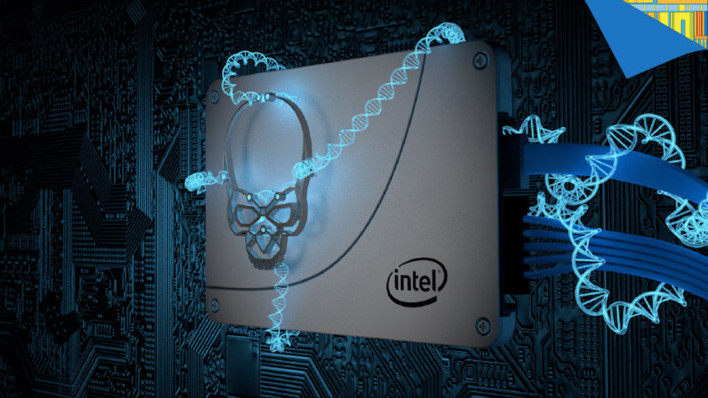The Intel
Corporation knows both the technical and commercial value of SSD’s and
has a selection to choose from. One of the frontrunners is the Intel 730 Series. This was introduced to market a couple of months ago in February 2014.
The drive was aimed squarely at professionals and enthusiasts, as it is a high-performance consumer SSD. This SSD was in contrast to recent drives that have taken to employing SandForce controllers with Intel’s firmware.
So this time, Intel went back to using its own controller and firmware and the drive specifies its own NAND flash, here 20nm MLC. Intel says that up to 70 GB of writes per day for the 480 GB capacity models can be accomplished, this suggests a total writespan of 127 TB. The firm is confident of the product’s endurance that they have offered a 5-year warranty.

Intel doesn’t specify any RAM cache details, it is understood though that the larger of the two available models at 480 GB uses 512 MB of DDR3 DRAM memory.
Intel’s figures of the internal power consumption are 5.5 W when active and 1.5 W while idle. Because of this power consumption, it is suggested this SSD would not be a great choice for laptops wanting a decent battery life.
The performance of this drive in uncomplicated sequential runs, will comfortably reach the SATA Revision 3.0 limit, achieving 559 MB/s for reads and 507 MB/s for writes.
So, with a good warranty, datacentre-class integrity and top-tier performance this SSD form Intel is hitting all the right notes. The drive gives an enormous data-write ceiling which is needless to say, very impressive.
The 730 Series is an expensive drive at £363 but if you want speed at the SATA limit and a formal guarantee from the manufacturer of long endurance, this Intel SSD will give you both.
As always, if you would like to leave a sensible comment, then please do so in the comments section below.
[Image via za.ign]
SOURCE:http://www.macworld.co.uk/review/ssd-flash/intel-730-series-ssd-480-gb-review-3515987/
The drive was aimed squarely at professionals and enthusiasts, as it is a high-performance consumer SSD. This SSD was in contrast to recent drives that have taken to employing SandForce controllers with Intel’s firmware.
So this time, Intel went back to using its own controller and firmware and the drive specifies its own NAND flash, here 20nm MLC. Intel says that up to 70 GB of writes per day for the 480 GB capacity models can be accomplished, this suggests a total writespan of 127 TB. The firm is confident of the product’s endurance that they have offered a 5-year warranty.

Intel doesn’t specify any RAM cache details, it is understood though that the larger of the two available models at 480 GB uses 512 MB of DDR3 DRAM memory.
Intel’s figures of the internal power consumption are 5.5 W when active and 1.5 W while idle. Because of this power consumption, it is suggested this SSD would not be a great choice for laptops wanting a decent battery life.
The performance of this drive in uncomplicated sequential runs, will comfortably reach the SATA Revision 3.0 limit, achieving 559 MB/s for reads and 507 MB/s for writes.
So, with a good warranty, datacentre-class integrity and top-tier performance this SSD form Intel is hitting all the right notes. The drive gives an enormous data-write ceiling which is needless to say, very impressive.
The 730 Series is an expensive drive at £363 but if you want speed at the SATA limit and a formal guarantee from the manufacturer of long endurance, this Intel SSD will give you both.
As always, if you would like to leave a sensible comment, then please do so in the comments section below.
[Image via za.ign]
SOURCE:http://www.macworld.co.uk/review/ssd-flash/intel-730-series-ssd-480-gb-review-3515987/


0 comments: